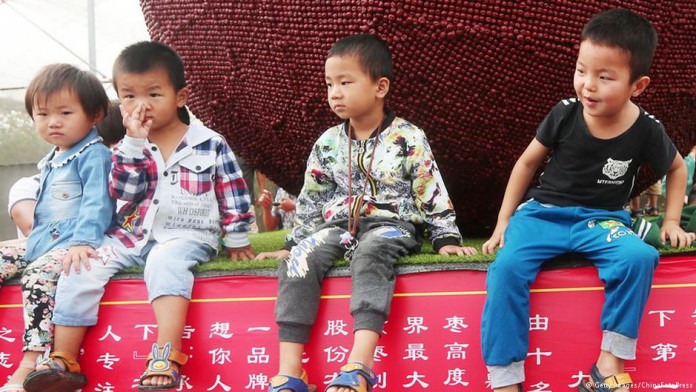Couples in China are allowed to have two children from now on. The Chinese government implemented the law after concerns mounted about the country’s shrinking population and ageing workforce.
The government in Beijing announced that it was putting an end to its one-child policy in October last year. The law to legally allow couples to have two children was put into effect on Friday, China’s official news agency Xinhua said.
Under the new law, married couples would be allowed to have a second child, but limits on additional births would remain.
As a result, around three million extra babies could be born each year over the next five years, officials from the National Health and Family Planning Commission predicted in November 2015.
An additional 30 million people would therefore be ready to join the country’s labour force by 2050.
Severe gender imbalance and a rapidly ageing population characterize China’s 1.37 billion population and experts have expressed concern that implementing the two-child policy now might do little to address China’s population problems. Furthermore, others warn that Chinese couples do not want more children, given the high cost of raising one child.
Beijing introduced its one-child policy in the late 1970s to control population growth and bolster food security. Rural families could have two children if the first is a girl – a response to the Chinese tendency to prefer male children to females. Ethnic minorities could also have an extra child.
Officials ensured people conformed to the rules by detailing a system of fines for violators, and raising the possiblity of forced abortions. The government argued that the rule was a key factor in contributing to China’s economic growth.
However, the law caused severe emotional distress to parents and led to sex-selective abortions in the male-dominated society.
OPINION: U-turn in Chinese family planning
Surprise in Beijing. The Chinese government is scrapping its strict one-child policy, allowing couples to have two children. DW’s Frank Sieren does not think the move will automatically solve the population problem.
The only surprise announced last October at the end of the summit of the Communist Party’s Central Committee was the scrapping of the one-child policy. In 1979, when it was introduced by the great reformer Deng Xiaoping, it seemed like a very good idea and it prevented China from having to feed 300 million more people today.
Too many disadvantages now
However, now the disadvantages outweigh the benefits. China has too many elderly people, not enough women and a decreasing workforce. In the future, Chinese couples will be allowed to have two children. Chinese women currently give birth to an average 1.55 children over their lifetime, but China needs a birth rate of 2.1 to guarantee a stable population density.
Two years ago, the government already relaxed the one-child policy rules somewhat, allowing parents to have another child if one of them had grown up an only child. Before, such permission had only been given if both parents had grown up as only children.
The government had hoped that the move would encourage 10 million couples to plan a second child, but this did not happen.
Three months ago, the Director of China’s Institute of Population and Labor Economics Zhang Juwei, surprised the public with his estimates:
He and his colleagues calculated that China’s population would peak at 1.41 billion in 10 years’ time, that is in 2025. By 2050, they found, the number would fall to 1.3 billion. China would then have some 70 million citizens fewer than today.
No other population is aging faster
The one-child policy has also contributed to the fact that increasingly, there are fewer younger people who can support the country’s many pensioners. By 2010, after 30 years of the strict policy, the average age had risen by 12 years to 34.5. Compared to Germany, where the average age is 45, this is still very young, but what’s dangerous is the rate at which China is changing. The number of pensioners is expected to reach 329 million over the next 25 years, thus almost doubling. No other country has aged as fast! The working proportion of the population – people between 20 and 60 years old – will have sunk from 817 million to 696 million.
For the future, this means that there will be a smaller workforce and increasing financial burdens on the social system. Reforms announced so far have not been able to remedy the situation. It remains to be seen whether the new two-child policy will make a difference. Far fewer people made use of the first relaxation of the one-child policy than the authorities had expected.
In China’s urban centers, the same factors as in Europe have long played a role when it comes to young couples deciding on whether to have another child or not: cost and career. For the young Chinese, who grew up as only children, careers are more important than ever before.
Parents need help
So important that often they have little time to bring up one child, let alone two. Moreover, it’s expensive to bring up children in China’s big cities. Kindergarten spaces, school and university education are becoming increasingly costly. If the government wants to motivate the population to have more children, it will have to implement more reforms, or it will have to subsidize babies. That would be the next step in the world’s most populated country.
-DW.COM















